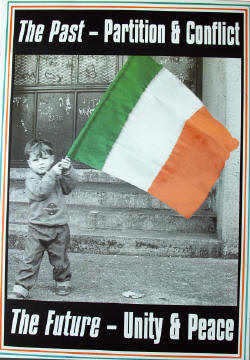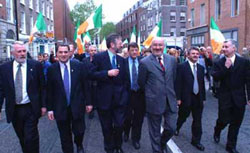 |
Irisch
Republikanische Solidarität
|
 |
NELSON FAMILY HOPES FOR JUSTICE
The Rosemary Nelson Inquiry opened yesterday, the largest public
probe yet initiated into any individual death of the conflict in
the North of Ireland.
The human rights lawyer and married mother of three, died as a
result of injuries she received when a bomb attached to her car
exploded on March 15th, 1999.
Her clients were mainly victims of police or unionist harassment
and violence. She rose to public prominence by representing
Garvaghy Road residents who were trying to prevent a march by the
Protestant Orange Order through their community.
Judge Peter Cory, who last year investigated allegations of
collusion in her death, found that she had been the subject of
escalating death threats from the RUC police since the mid-1990s.
No-one was charged over the murder, although a former British
soldier and a known police informant have been implicated.
Her family had been campaigning for a public inquiry into the
murder, and allegations of collusion, since her death.
The opening day of the inquiry was a largely symbolic event that
ended with the adjournment of proceedings so that an
investigative process can begin before public hearings are held
next spring.
But the public session in Craigavon Civic Centre - not far from
the scene of Mrs Nelson's 1999 murder - saw the three-member
inquiry panel give a detailed insight into the scale of their
plans.
Before an audience that included Mrs Nelson's close relatives,
the inquiry chairman, retired British High Court judge Michael
Morland, read an 18 page opening statement, saying: "Our task is
to seek out the truth."
He said Mrs Nelson's murder was "one of thousands which were
committed during the terrible years of sectarian violence", but
one that continued to attract "interest and concern both here and
abroad".
Mr Moreland was joined yesterday by his inquiry colleagues
Valerie Strachan, former chair of Britain's Board of Customs and
Excise, and Anthony Burden, a former British police chief
constable.
Mrs Nelson's husband Paul, her mother Sheila, as well as the
police and the NIO, are among the small number of individuals and
organisations who will be given 'full participant status' and be
legally represented at the inquiry.
The inquiry has the powers to force the surrender of documents to
it and to compel witnesses to attend.
But with no ruling on anonymity for witnesses to the inquiry Sir
Michael also addressed the issue of any criminal proceedings that
may follow.
He did not call for an amnesty, but suggested that the inquiry
would benefit from pledges from the Attorney General.
After the chairman's opening statement the hearing was adjourned
to allow its team to spend months preparing for the full public
hearings when witnesses will be called.
A venue for those hearings has yet to be agreed, but Mr Moreland
said it was hoped they would begin in the spring of next year.
After the opening session of the public inquiry had ended,
friends and relatives spoke privately of it being a day of
confused emotions.
Mr Nelson's solicitor Barra McGrory said it had been a "long
road" for the family.
"We will give every cooperation and we sincerely hope that it
will succeed in its clear and stated intention to get to the
truth," he said.
Eunan Magee, Mrs Nelson's brother said the family were
"cautiously optimistic".
AMNESTY CALLS FOR BOYCOTT OF FINUCANE INQUIRY
Geraldine Finucane, the widow of solicitor Pat Finucane, was
present at the opening of the inquiry yesterday. The murder of
her husband and the evidence of Crown force collusion has led to
parallels being drawn with Mrs Nelson's murder.
Amnesty International this [Wednesday] morning called on all
judges in Britain to decline appointments to sit on any inquiry
set up under the recently-enacted Inquiries Act - including the
planned inquiry into the murder of Pat Finucane.
The campaigning organisation also called for the repeal of the
act.
The Amnesty call came days after a similar request to judges from
Mr Finucane's widow Geraldine who wrote individually to every
senior judge in England, Scotland and Wales earlier this week.
Amnesty UK campaigns director Stephen Bowen said: "By holding an
inquiry into the Finucane case under the Inquiries Act 2005, the
UK Government is trying to eliminate independent scrutiny of its
agents."
He added: "Any judge sitting on such an inquiry would be
presiding over a sham."
Letzte Änderung:
23-April-05